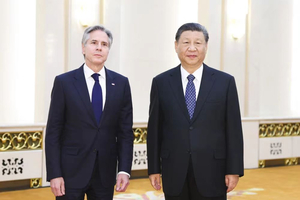Weekend Long Read: Dialogue Between Hu Shuli and Joseph Nye on China-U.S. Relations
Listen to the full version

The U.S.-China relationship will not return to the age of engagement no matter who wins the U.S. presidential election this year, said Joseph Nye, former dean of Harvard's Kennedy School of Government, during a dialogue with Hu Shuli, publisher of Caixin Media on Friday.
Speaking via video link at the Caixin Summer Summit in Hong Kong, the 87-year-old Harvard distinguished professor emeritus predicted a “50:50” chance for either the incumbent U.S. President Joe Biden or his predecessor, Donald Trump, to win the race for the White House in November.

Download our app to receive breaking news alerts and read the news on the go.
Get our weekly free Must-Read newsletter.
- DIGEST HUB
- The U.S.-China relationship won't return to the age of engagement regardless of the U.S. presidential election's outcome, according to Joseph Nye.
- Nye highlights similar China policy continuity under either Biden or Trump, with Trump likely pursuing a "more restrictive and dangerous" approach.
- The dialogue also addresses generational differences in U.S. policy-making, economic interdependence, and global cooperation on issues like climate change and pandemics.
Joseph Nye, a distinguished professor emeritus at Harvard and former dean of the Kennedy School of Government, asserted that the U.S.-China relationship is unlikely to return to the age of engagement regardless of the outcome of the upcoming U.S. presidential election [para. 1][para. 2]. Speaking at the Caixin Summer Summit in Hong Kong, Nye predicted an even chance (50:50) for either Joe Biden or Donald Trump to win the November election [para. 2].
Nye, who introduced the concept of “soft power” in international relations, emphasized that irrespective of the winner, both candidates would likely pursue the existing China policy aimed at great power competition. However, a win for Trump could lead to a "more restrictive and dangerous" policy towards China, while a second term for Biden might provide a "much better" environment for bilateral cooperation [para. 3][para. 4].
Hu Shuli, the publisher of Caixin Media, noted a significant generational difference among the U.S. elite who formulate policy towards China. The older generation places greater emphasis on historical lessons from past experiences, particularly the Cold War, whereas the younger generation is more focused on current realities, sometimes disregarding history [para. 5][para. 6][para. 7].
Nye dissected the evolution of U.S.-China relations into four distinct phases since 1949: the Korean War period, the post-Nixon visit phase, the engagement phase ending around 2015-2016, and the current phase of great power competition [para. 9][para. 10]. He attributed the end of the engagement phase to China’s conclusion that the U.S. was in decline following the 2008 Great Recession, coupled with growing American mistrust of China’s trade practices and intellectual property policies [para. 11].
Next, Nye discussed the scope and depth of U.S.-China decoupling, suggesting that an outright break in trade relations would be harmful to both economies and globally, given the half a trillion dollars in bilateral trade. He proposed categorizing trade relations into three baskets: national security-related issues, negotiable areas, and normal trade under World Trade Organization rules [para. 12][para. 13][para. 14][para. 15][para. 16].
Despite the competition, Nye stressed the importance of cooperation in areas of mutual benefit, like combating global climate change, managing pandemics, and controlling the proliferation of nuclear and new weapons technologies. He noted historical successes, such as cooperation during the SARS epidemic, and warned of the risks of miscalculation, drawing a parallel to the unexpected escalation into World War I [para. 17][para. 18][para. 19][para. 20][para. 21][para. 22][para. 23].
Nye elaborated that while economic interdependence raises the cost of conflict, it cannot fully prevent war, exemplified by the pre-World War I trade ties between Germany and Britain. He mentioned that asymmetrical dependence could be exploited as a power dynamic but emphasized that balanced interdependence lacks such leverage [para. 24][para. 25].
Addressing the Russia-Ukraine conflict, Nye expressed pessimism about the peace summit making significant progress. He reasoned that President Putin might be prolonging the war in hopes of a more favorable U.S. administration post-election, given Trump’s less committed stance on Ukraine. Additionally, he underscored the immovability of both Russia’s stance on Ukraine’s legitimacy and Ukraine's unwillingness to cede occupied territories, foreseeing a protracted conflict with no swift resolution [para. 26][para. 27][para. 28].
This dialogue between Nye and Hu was part of a broader discussion at the Caixin Summer Summit 2024, providing nuanced insights into the complexities of U.S.-China relations and other global issues [para. 1][para. 29].
- PODCAST
- MOST POPULAR






